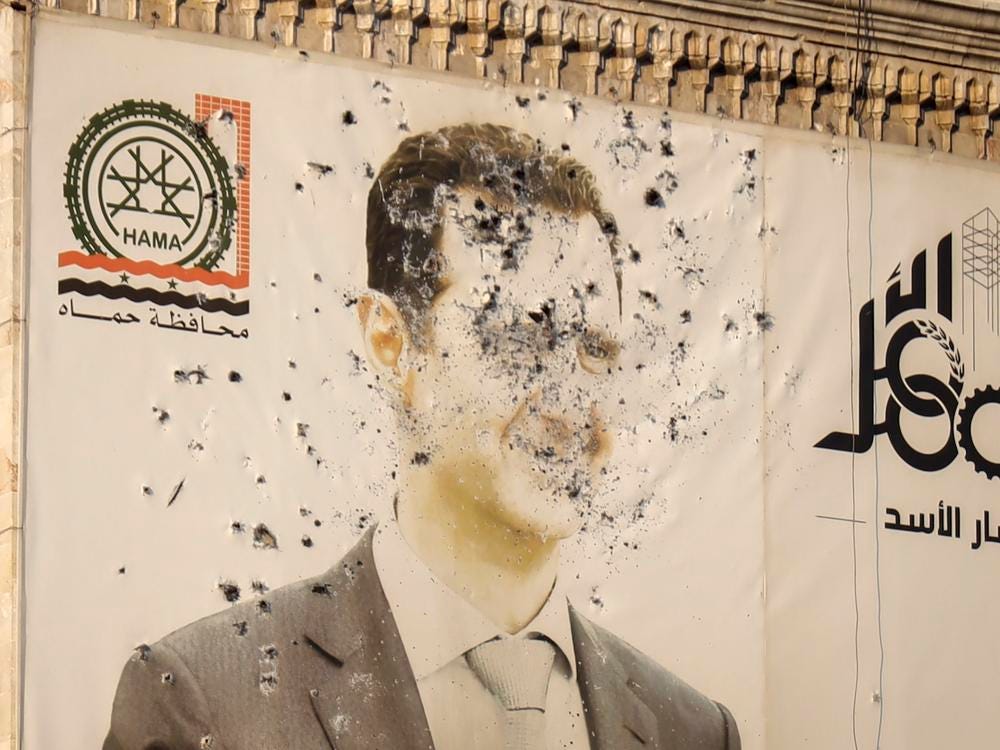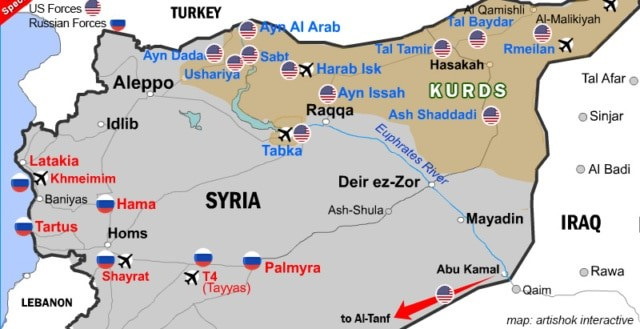Transitioning to Nowhere: Syria's Uncertain Future
Proxy players contend in a complex ethnic, linguistic, and sectarian landscape
By: Salman Rafi Sheikh
While reports of celebrations across key Syrian cities over the fall of Bashar al-Assad’s 24 years of rule might bring a glimpse of hope for a better future, what the future exactly holds is far from certain. While this is certainly the end of the Assad dynasty, what it will lead to is in the dark, not only for Syria. It has the potential to reshape the entire Middle East, possibly to no one’s benefit.
Al-Assad's Arab Socialist Ba'athist regime has been overthrown by a cohort of “rebels” led by Hayat Tahrir al-Sham (HTS), a coalition of Islamic groups formerly associated with al-Qaeda’s branch in Syria and globally designated as terrorist, not by a movement led by common Syrians. Half of Syria’s prewar population of 23 million have been made internal or international refugees by the war. The transition thus might mean Syria’s descent into a lot more chaos and geopolitics than a transformation into a democracy.
Certainly, Assad’s ouster, at least for now, means Iran’s influence has likely ended, along with Hezbollah’s privileged position, weakened by Israel’s destruction of its capabilities in Lebanon. The future of all the contending proxy forces is likely, along with Syria’s once-dominant role in Lebanon, to take months to take shape. Turkey may be the only country with a winning strategy, its backing of the rebels giving Ankara considerable leverage over the stabilization and rebuilding process,
Lessons learned from elsewhere make the possibility of turmoil much stronger. When the ideologically-driven Taliban violently took over Afghanistan in August 2021, no one believed that Afghanistan would become a democracy and the Taliban have not proven us wrong. In Syria, the overthrow has a similar ideological and violent imprint. In addition, the involvement of multiple international actors in a multi-ethnic country central to the jigsaw puzzle that makes up the Middle East is most likely to make the equation a lot more complicated and problematic. For the United States, for instance, while advisers are urging major aid contributions from the Biden administration to moderate elements among the rebels, in 42 days Donald Trump, publicly vowing to stay clear of the entire situation, will take over as US president.
Who’s in Control?
Reports indicate that as major international players like Russia and the US are watching the situation from a distance, both maintain military bases in the country. The US has the MSS Euphrates base east of Deir ez-Zor, the seventh largest city in Syria, lying to the northeast of the capital.
"The United States will continue to maintain its presence in eastern Syria and will take measures necessary to prevent a resurgence of the Islamic State," Deputy Assistant Secretary of Défense for the Middle East Daniel Shapiro told the Manama Dialogue security conference in Bahrain. In simple terms, the US hopes, perhaps vainly, to not only be not going anywhere, but is also going to be deeply involved in shaping the post-regime transition. For Washington, a key Russian ally has fallen and there is no denying that the situation should be exploited to its advantage, although now uncertain under Trump.
For the same reason, Russia, having rescued Assad and flown him to Moscow, is not going anywhere either. In the West Syrian province of Latakia, bordering Turkey’s Hatay province, Russia maintains an air base. In yet another West Syrian region of Tartous, Moscow also has a naval base. For now, it has put its bases on very high alert, indicating its intent to stay.
Turkey-backed “rebels,” also known as the Syrian National Army, are presently in control of parts of the Aleppo province. Israel, on the other hand, has decided to seize the Syrian buffer zone that separates the Israeli-occupied Golan Heights from the rest of Syria. It doesn’t want armed Islamists on its borders at a time when it is already involved in brutal wars against the Palestinians in Gaza and the West Bank and Hezbollah in Lebanon.
In addition, the Kurdish-led Syrian Democratic Forces (SDF) also control about a quarter of the Syrian territory in the east. Apart from most of Raqqa province including the city, the SDF also has half of neighboring Deir ez-Zur and part of Aleppo province under its control.
Last but not least, Iran-backed groups played a big role in winning what is now the first phase of the Syrian civil war. In the present phase, however, they have been forced to withdraw to the region where a beleaguered Russian military is present.
It is unlikely that Russia and Iranian forces would coordinate to attack the rebels now that al-Assad has already fled, but there is little denying that they have huge stakes in the transition, not to mention the entire region they had recently hoped to dominate, as much as what exactly the transition will look like, if it takes place at all. In fact, there is a real possibility of a civil war breaking out given that there is an armed Syrian military force and there are several armed groups involved in the overthrow. Still, there are questions about whether the rebel alliance, composed of such contradictory elements, will be able to sustain itself and prevent an unraveling, given the complex ethnic, linguistic, and sectarian social landscape of the country.
The very multiplicity of domestic and international actors is nothing short of a dark shadow looming large over Syria. With these actors controlling various parts, a de facto territorial disintegration, or at least a drastic lack of territorial unity, seems highly possible. This is where Syria might become another Libya and/or Yemen.
Regional Fears: new Arab Spring?
The fall of the regime to armed Islamists and the collapse of the entire country has made many Arab capitals seriously uncomfortable. Is this the beginning of a new Arab spring insofar as Arab kingdoms, despite the wealth they possess, are vulnerable to the possibility of mass uprisings? Muhammad bin Salman (MBS) recently spoke of threats to his life, acknowledging the existence of elites opposing his rule. Will this elite see the Syrian collapse as an opportunity to stir trouble in the Kingdom? Will this collapse revive memories of the fall of the Mubarak regime in Egypt? Will Egyptians rise against the current dictator?
These are real fears. The Egyptian regime emphasizes maintaining the state structure intact, while the Saudis are reportedly talking to all regional stakeholders. Nobody wants a spillover. While they may welcome that Assad is finally gone, none of them wants to see the Islamists in control. There is enough motivation for various Arab states to extend their support to selective “rebel” groups as a means to influence the transition. Syria’s Sunni, Arab, Kurdish, Turkman, and Shia groups could see their politics aligning with relevant external players as they did in a permanently fragmented Iraq after the disastrous 2001 invasion engineered by the Bush administration in Washington.
In addition, while Assad may have fallen, his Alawite sect is the second largest in Syria. They are concentrated in Western Syria, where Russian forces are also present, and they become naturally attractive for Moscow to co-opt just as the Syrian Democratic Forces (SDF), a Kurdish-led coalition of ethnic militias and rebel groups, is based in the east and northeast and is closely allied with Washington.
Therefore, while Syria should ideally be left to the Syrians alone, that seems extremely unlikely. The celebrations certainly indicate the unpopularity of a brutal, deposed regime that committed savage atrocities over the 13-year civil war. They are hardly an indication of what will happen tomorrow. The leading rebels have no manifesto. But based on how HTS ruled Idlib for years and assuming it somehow manages to sustain control, a new form of iron-fist rule will follow Assad’s fall.
Dr Salman Rafi Sheikh is an assistant professor of politics at the Lahore University of Management Sciences (LUMS) in Pakistan. He is a long-time contributor on international affairs to Asia Sentinel.



Excellent article. In a choice between the Devil that was Assad and the Deep Blue Sea of revolution against him... we're about to find out what the Deep Blue Sea is actually like.
Nice article professor